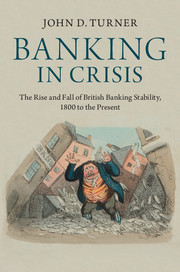Description
Banking in Crisis
The Rise and Fall of British Banking Stability, 1800 to the Present
Cambridge Studies in Economic History - Second Series
Author: Turner John D.
A full account of the rise and fall of British banking stability which sheds new light on why banking systems crash.
Language: English
Subject for Banking in Crisis:
Approximative price 76.05 €
In Print (Delivery period: 14 days).
Add to cart
Banking in Crisis
Publication date: 07-2014
266 p. · 15.2x22.9 cm · Hardback
Publication date: 07-2014
266 p. · 15.2x22.9 cm · Hardback
Approximative price 31.44 €
In Print (Delivery period: 14 days).
Add to cart
Banking in Crisis
Publication date: 07-2014
266 p. · 15x22.6 cm · Paperback
Publication date: 07-2014
266 p. · 15x22.6 cm · Paperback
Description
/li>Contents
/li>Biography
/li>
Can the lessons of the past help us to prevent another banking collapse in the future? This is the first book to tell the story of the rise and fall of British banking stability over the past two centuries, shedding new light on why banking systems crash and on the factors underpinning banking stability. John Turner shows that there have only been two major banking crises in Britain during this time - the crises of 1825?6 and 2007?8. Although there were episodic bouts of instability in the interim, the banking system was crisis free. Why was the British banking system stable for such a long time? And, why did the British banking system implode in 2008? In answering these questions, the book explores the long-run evolution of bank regulation, the role of the Bank of England, bank rescues and the need to hold shareholders to account.
Acknowledgements; 1. Introduction: holding shareholders to account; 2. Banking instability and risk shifting; 3. The evolution of British banking structure and stability since 1800; 4. Major and minor British banking crises since 1800; 5. Banking stability, shareholder liability and bank capital; 6. Averting or creating banking crises? The lender of last resort and bank rescues; 7. Banking stability and bank regulation; 8. Restoring banking stability: policy and political economy; Bibliography; Index.
John D. Turner has been a Professor of Finance and Financial History at Queen's University Belfast since 2005. At the time of his appointment to his chair, he was one of the youngest full professors in Queen's University. He is the founder and director of the Queen's University Centre for Economic History. John Turner teaches money, banking and finance to undergraduate and postgraduate students. He is also an active blogger - he writes a blog (www.financelongrun.co.uk), aimed at his students and interested others, which centres on the past, present and future of finance. His research, which has been published in all the leading economic and business history journals, as well as economics journals, is focused on the long-run evolution and development of banking, banking crises, bubbles, corporate law, and financial markets. His research has been funded by the British Academy, Economic and Social Research Council, and the Leverhulme Trust. He has held several distinguished visiting positions during his career - he has been a Houblon–Norman Fellow at the Bank of England and an Alfred D. Chandler Fellow at Harvard Business School.
© 2024 LAVOISIER S.A.S.
These books may interest you

British Financial Crises since 1825 140.09 €



